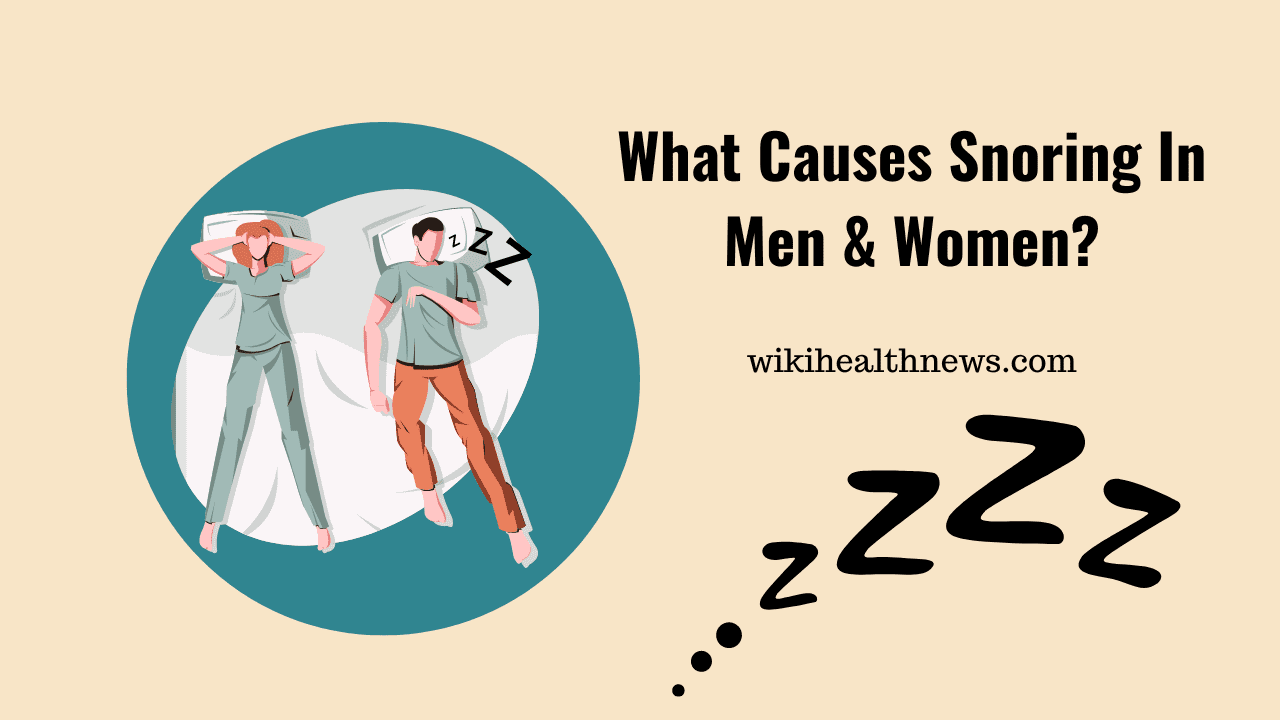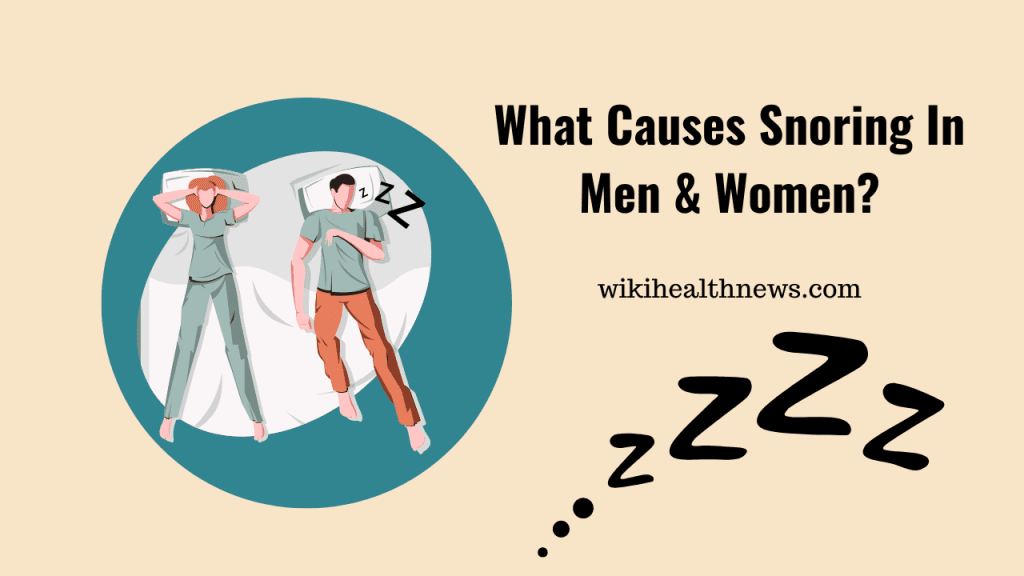What Causes Snoring In Men & Women?

What is snoring?
Snoring is noisy breathing which comes while in sleep. It’s a common problem that can affect anyone. However, it occurs more often in men and in people who are obese. Snoring gets worse with age.
Snoring once in a while is not a serious problem. It’s mostly a disturbance for the bed partner. But if it’s a long period snorer, it will cause some kind of disease.
Snoring is also a symptom of a bad health condition like obstructive sleep apnea. Discuss about that to the doctor if you’re snore often or very loudly, or if the partner notices that sometimes you may stop breathing altogether. Then that might wanted a medical for better sleep.
How common is snoring?
Snoring is very common problem among people. Everybody will snore at any point in their life. It’s very common in men above the age of 50 who have overweight or obesity.
Who is more likely to snore?
Mostly everyone snores from time periods, including babies, children and adults. Most of the people are more likely to snore more than others. Snoring risk factors will include:
- Age: Snoring is very common in aged people because muscle tone reduced and will causing airways to constrict.
- Alcohol and sedatives: Alcoholic beverages and some medications relax muscles, restricting air to go inside the mouth, nose and throat.
- Anatomy: A long soft palate, enlarged adenoids, tonsils or a large tongue can make it difficult for air to flow through the nose and mouth. A deviated septum makes flow of air restricted.
- Gender: Snoring is very common in men.
- Family history: Snoring is also getting in families.
- Overall health: Nasal stuffiness which causes allergies and the common cold restrict airflow through the mouth and nose. Pregnant people are also snore because of hormonal changes and weight gain.
- Weight: Snoring and sleep-related breathing disorders are very common in people who is overweight or obesity.
What causes snoring?
Snoring develops when the flow of air through the mouth and nose is blocked. Several things can cause air flow blockage, including:
- Blocked nasal airways. Most of the people snore only during allergy season or when they have a sinus infection problem. Problems in the nose like deviated septum (when the wall that separates one nostril from the other is off-center) or nasal polyps will also block the airways.
- Poor muscle strength in the throat and tongue. Throat and tongue muscles can be too relaxed, which develop them to collapse into the airway.
- Bulky throat tissue. Being obese can cause snoring. Some child will have big tonsils and adenoids that create them snore.
- Long soft palate and/or uvula. A long soft palate or a long uvula (the dangling tissue in the back of your mouth) can district the opening from the nose to the throat. When breathe occurs, this causes them to vibrate and bump against one another, and the airway becomes blocked.
- Alcohol and drug use. Drinking alcohol or taking muscle relaxers will also develop the tongue and throat muscles relax very much.
- Sleep position. Sleeping on the back will develop snoring.
- Sleep deprivation. The throat muscles will relax so much if you’re not getting good sleep.

Diagnosis and Treatment
The partner might be the person who noted that the other is snoring. The doctor will ask both the partner about the snoring and symptoms.
The doctor will also collect about the medical history and proceed a physical exam to look for things that may block the airways. Few conditions as chronic nasal congestion gives rise to rhinitis or sinusitis in the long run. A deviated septum, or swollen tonsils are common findings. The doctor will give some test to do such as:
- Imaging tests.
An X-ray, MRI scan, or CT scan will help o identify the problems in the airways.
- Sleep study.
Here you may undergo with machine monitor sleep. Here you need to spend the night in a lab for a test called polysomnography. It will monitor things like heart rate, breathing, and brain activity while in sleep.
Treatments :
- Lifestyle changes.
The doctor will tell about to reduce the weight, quit smoking, or stop drinking alcohol before bed.
- Oral appliances.
Here need to wear a small plastic device in the mouth while sleep. It keeps the airways open by moving the jaw or tongue.
- Surgery.
Several kinds of procedures will treat the snoring. The doctor might remove or shrink tissues in the throat, or develop soft palate stiffer.
- CPAP.
A continuous positive airway pressure machine help to treat sleep apnea and might decrease snoring by blowing air into the airways while sleep.
Surgical treatments for snoring:
In most of the cases, snoring and sleep disordered breathing are treated with surgery to shrink or take excess tissue or correct a structural problem. Most of these procedures are minimally invasive. The doctors will put small incisions, and then the patient will go home the same day.
Surgery for snoring includes:
- Laser-assisted uvulapalatoplasty (LAUP): LAUP decrease the tissue in the soft palate and increase airflow.
- Radiofrequency ablation: Also called Somnoplasty, this technique uses radiofrequency energy to remove excess tissue in the soft palate and tongue.
- Septoplasty: This kind of procedure will straighten a deviated septum in the nose. A septoplasty increases airflow through the nose by reshaping the cartilage and bone.
- Tonsillectomy and adenoidectomy: The doctors will remove extra tissue from the back of the throat (tonsillectomy) or the back of the nose (adenoidectomy).
Home Remedies to Stop Snoring
- These are home remedy solutions to get a good night’s sleep.
- Sleep on your side, not by back.
- Raise the head of the bed a few inches.
- Use nasal strips that stick to the bridge of the nose to open the nostrils.
- Stick to a sleep schedule.
Complications
Snoring doesn’t have many complications. But sleep apnea will develop some problems, including:
- Frequent waking from sleep
- Light sleeping. Waking up many times a night will disturb the normal pattern of sleep.
- Heart problems. Long-term obstructive sleep apnea mostly increases blood pressure and may make the heart get bigger, with increase the risks of heart attack and stroke.
- Poor night’s sleep. This develops sleepy in day, which can disturb with quality of life, and can make car accidents.
Read more











